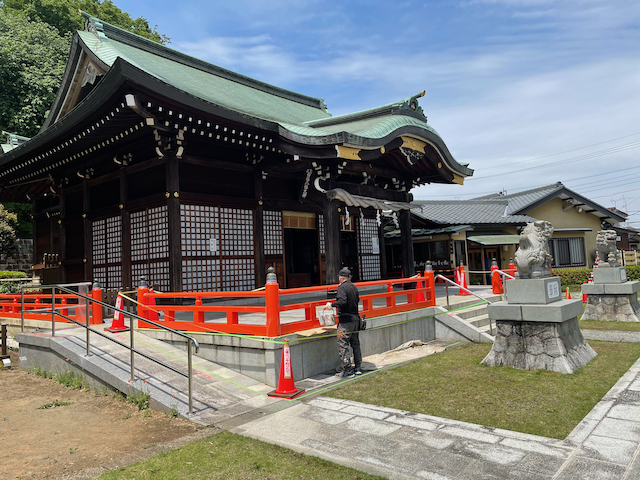My local jinja, Shirahata Hachiman Daijin, has just done some maintenance around the precincts. The photograph shows people repainting the railings around the platform in front of the prayer hall, but paint was also touched up elsewhere, and the bamboo fence behind the purification font was also replaced.
This sort of maintenance is important, but I have the impression that it is the aspect of jinja management most likely to be neglected. Day-to-day essentials have to be done, because they are necessary right now, and so the jinja’s basic income is devoted to them. Large-scale rebuilding or new construction can be funded by a special appeal, and large donors can be offered the chance to have their name put on a board, or even carved on the new thing itself. (The red paint emphasising the names of donors on a couple of stone lanterns was one of the things being maintained this time.)
This sort of routine maintenance falls between these two. It never needs to be done right now. The paint can fade and flake, and the fence can get old, without seriously interfering with the operation of the jinja. That means that, for jinja that are not rich, there is always going to be a higher priority. On the other hand, there is nothing to put a donor’s name on, so it is hard to run a special appeal to fund them.
To solve this problem, some jinja seem to store up all the maintenance, and then do it all at once, giving the project a name and running a special appeal to raise funds for that project. Really small jinja, of course, just do not do it, and everything slowly falls into disrepair.
There is, of course, nothing specific to Shinto about this problem, but I think it is important to remember the practical issues.

Aloha David! Thank you. What is the financial management structure for a staffed jinja? I understand the donated money goes into a religious corporation bank account (or should although with cash donations this might be area with a lack of accounting documentation). Who makes the decision on how donated money is spent? Who does the financial planning, which should include normal jinja management? Who makes decisions about the employee compensation? Who makes the actual employee payment? Does the Jinja Honcho provide any financial management guidance to its members? Are religious corporation required to have independent auditors to review their financial management? In my experience, understanding the financial management of an organization usually helps the organization to find ways to improve. Thankful.
It varies from one jinja to another; a jinja with an annual income in the billions of yen needs a rather more elaborate structure that one that makes hundreds of thousands. Ultimately, the chief priest is the head of the religious corporation, which means that the final responsibility for all the decisions is his (or hers), but there must be at least three officers with some sort of formal authority, and larger jinja may have more.
Jinja Honchō does provide training and guidance on the practical and legal side of running a jinja, but I have no idea how detailed (or useful) it is.
Thank you!